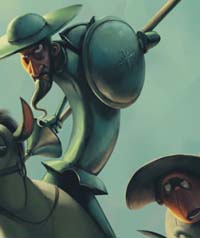 All-star fucktard, Jonah Goldberg has something to say about the United Nations. You know conservatives: they don’t like the United Nations because it represents the promise of cooperation. And it goes against this ridiculous notion of American Exceptionalism. This is why conservatives get apoplectic when someone talks about using foreign legal precedents in the United States or suggests that maybe our 230 year old Constitution is not the best one ever created.
All-star fucktard, Jonah Goldberg has something to say about the United Nations. You know conservatives: they don’t like the United Nations because it represents the promise of cooperation. And it goes against this ridiculous notion of American Exceptionalism. This is why conservatives get apoplectic when someone talks about using foreign legal precedents in the United States or suggests that maybe our 230 year old Constitution is not the best one ever created.
My point is: who cares what Jonah Goldberg has to say about the United Nations? I certainly don’t. But he used Don Quixote to discuss his ridiculous notion of starting a new United Nations—one that only includes the “morally and politically serious nations.” By that, he means nations that agree with his corporatocratic notions of freedom and democracy. And by that he means slavery and aristocracy. Regardless of his silly and evil ideas, I do wish he would keep Cervantes out of it—a man who appears to have been decent and who has provided much joy to the human race.
Goldberg doesn’t even get Don Quixote right. My guess is that he hasn’t read it. There are many documented cases of copies of the book bursting into flames when touched by conservatives. And by that I mean there haven’t been any, but it would make sense. Anyway, Goldberg writes:
Really? Is that what it means? I find this surprising, because it is totally wrong. It means fighting a hopeless battle in a ridiculous manner. There is no romantic ideal here; this isn’t Battle of the Alamo.
There is, of course, another way to view the term—one that goes along with the book. Unfortunately, few have read it and so this idea doesn’t make sense anywhere but on a blog by a guy who has an unnatural affinity for the novel. It is implicit in Goldberg’s next sentence, which I’ll bet was added at the last minute by an editor who noted what I had:
I’ve previously written about what the word “quixotic” personally means to me. It is not what it generally means. Just the same, “tilting at windmills” to me means attacking phantoms—things that aren’t there. But there was nothing irrational about Don Quixote attacking those giants. The problem was that his perceptions were wrong because, you know, he was crazy.
In this way, Goldberg’s analogy is apt. The conservatives (like him) who want to create a United Morally and Politically Serious Nations are indeed attacking something that is only in their minds. By wanting to unite a number of like-minded nations, all they want is to create a power block. Their problem with the United Nations is that some nations don’t agree with them. I understand this. I agree with many of the things that Goldberg finds repugnant. But his solution is to get rid of the United Nations so that the stronger nations can bind together and conquer the other nations. Even apart from the fact that this in impossible given the nuclear stockpiles of “morally and politically unserious nations,” this would only takes us back to the days before the United Nations when we had, let’s see, two world wars.
Don Quixote works very well to explain conservative thought—just not in the way that Goldberg thinks. Don Quixote also works well to explain rigid ideologues on the left, although I don’t know any (they were fairly common 90 years ago). Don Quixote was the very definition of a ideologue. He was so committed to his vision of the ideal of knights errant that he could not see the world the way it actually is. Pragmatists, like the modern left do not suffer from this. Modern conservatives, however, are this way—at least the ones who aren’t just in it out of self-interest (not that the two don’t fuse together in many cases).
